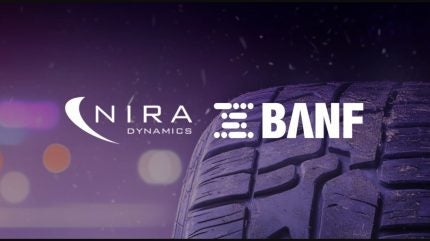
NIRA Dynamics, a Swedish automotive software company, has announced a strategic partnership with South Korea’s BANF Smart Tire System to enhance vehicle safety and predictive maintenance.
This collaboration will integrate BANF’s advanced high-frequency tyre sensors into NIRA’s software ecosystem, improving real-time monitoring capabilities for commercial vehicles.

Discover B2B Marketing That Performs
Combine business intelligence and editorial excellence to reach engaged professionals across 36 leading media platforms.
The company’s indirect Tire Pressure Monitoring System (iTPMS) recently surpassed 110 million units sold, highlighting its commitment to vehicle safety and sustainability.
As part of the agreement, NIRA will incorporate BANF’s triaxial tyre sensors into its Road Surface Information (RSI) and Wheel Safety Insights (WSI) platforms.
These platforms provide functions such as tyre grip estimation, tread wear analysis, and loose wheel detection by processing data from existing vehicle sensors.
BANF’s Smart Profiler system offers a hardware advancement by wirelessly powering sensors inside fast-spinning tyres, connected to the vehicle battery.
This innovation addresses a key challenge in tyre digitisation—ensuring continuous power and real-time data transmission from rotating tyres.
NIRA Dynamics Innovation head Otto Johansson stated: “This collaboration accelerates our vision of creating a comprehensive vehicle intelligence network. While our software solutions already process data from millions of vehicles, adding specialised hardware enables new use cases in predictive maintenance and ADAS applications.”
The company’s collaborations with automotive giants like Volkswagen Group have led to innovations such as Road Surface Alerts, which inform drivers of road hazards based on real-time friction and vehicle data.
NIRA’s focus on medium and large commercial vehicles addresses pressing safety challenges, including thousands of annual wheel detachment incidents reported by the Swedish Tire Safety Council.
NIRA’s Loose Wheel Indicator (LWI), used in Audi vehicles since 2017, detects lug nut loosening using existing wheel speed sensors. This technology is now being extended to heavy-duty vehicles through the BANF partnership.
For fleet operators, NIRA’s integrated system offers operational benefits.
Its Winter Road Insights product helps Scandinavian road authorities optimise salt use and ploughing routes by analysing friction data from connected vehicles.
Combined with BANF’s wear prediction algorithms, fleets can expect reduced tyre replacement costs and improved fuel efficiency.
BANF Business Development head Ron Yoogun Lee added: “Our goal is to enhance cost-effectiveness, save lives, and preserve the environment by digitising tyres, which are the last analog domain in the mobility industry.”
NIRA’s technology roadmap extends beyond traditional applications.
Its Road Surface Conditions product creates “grip maps” that enable SAE Level 2-3 autonomous vehicles to adjust driving behaviour based on real-time friction data collected from various sources, including BANF’s tyre-level sensors.
Leveraging data from several million vehicles, NIRA is also developing AI models for predictive infrastructure maintenance.






